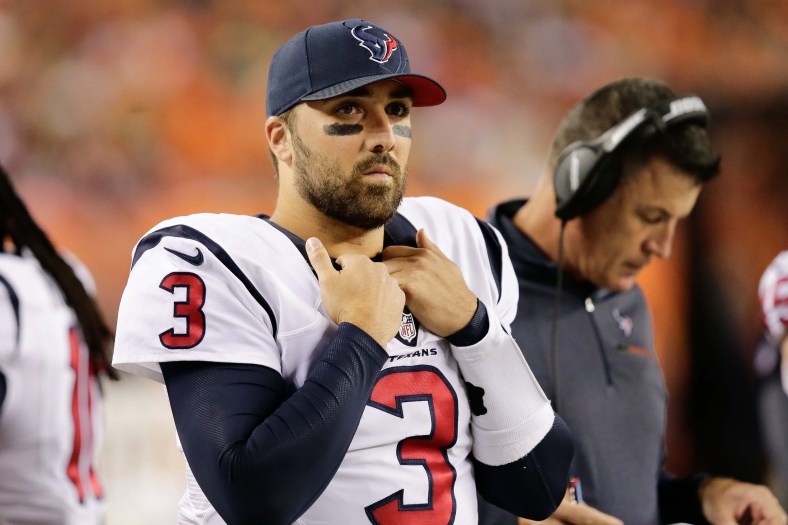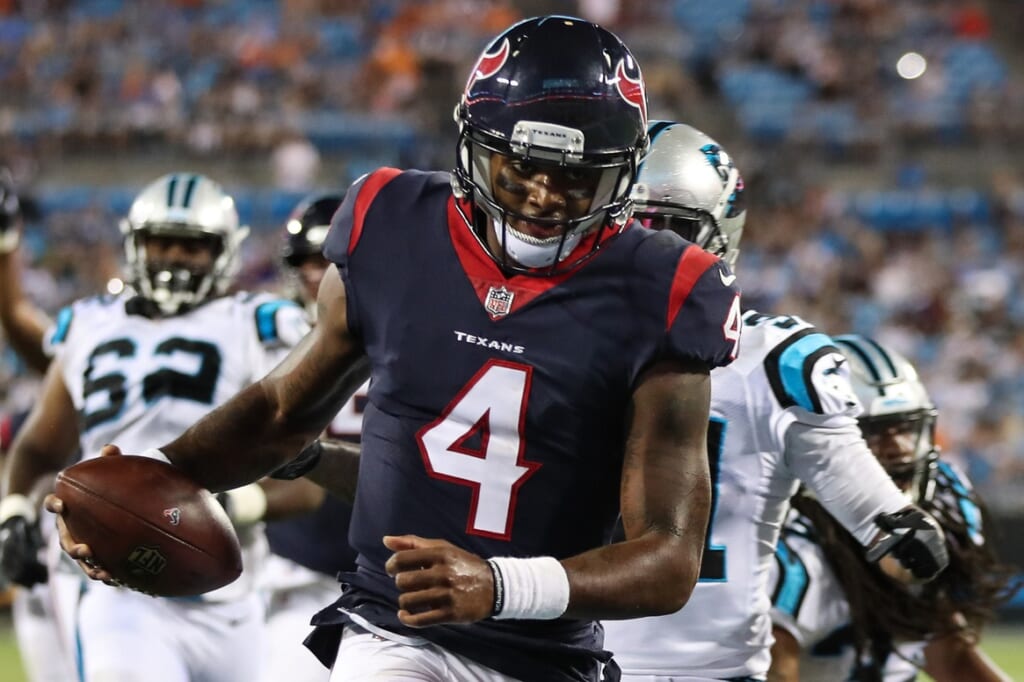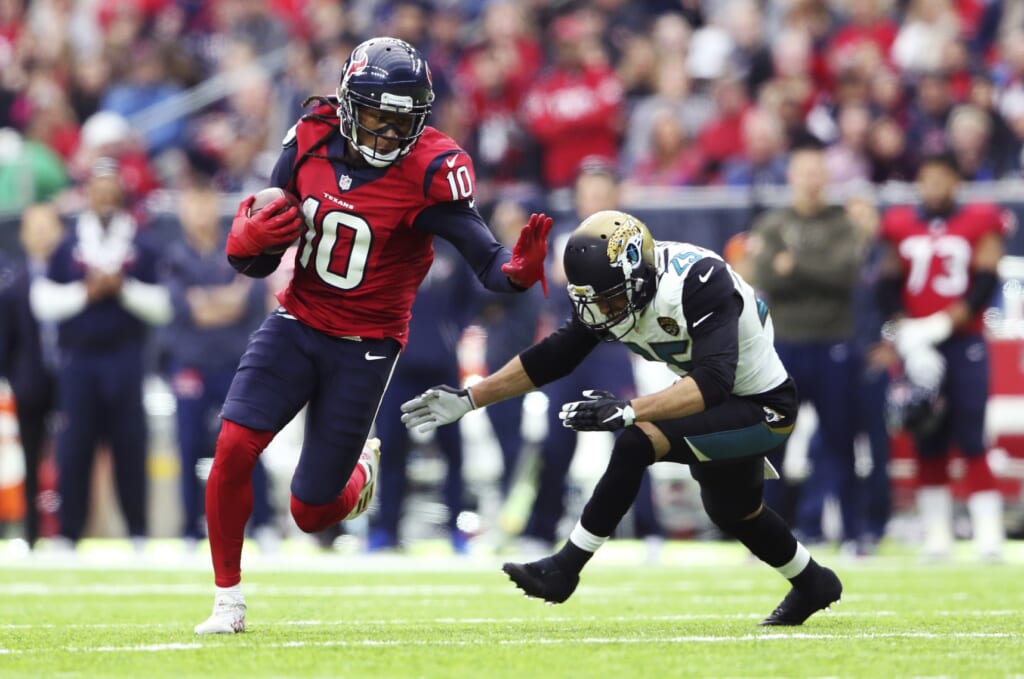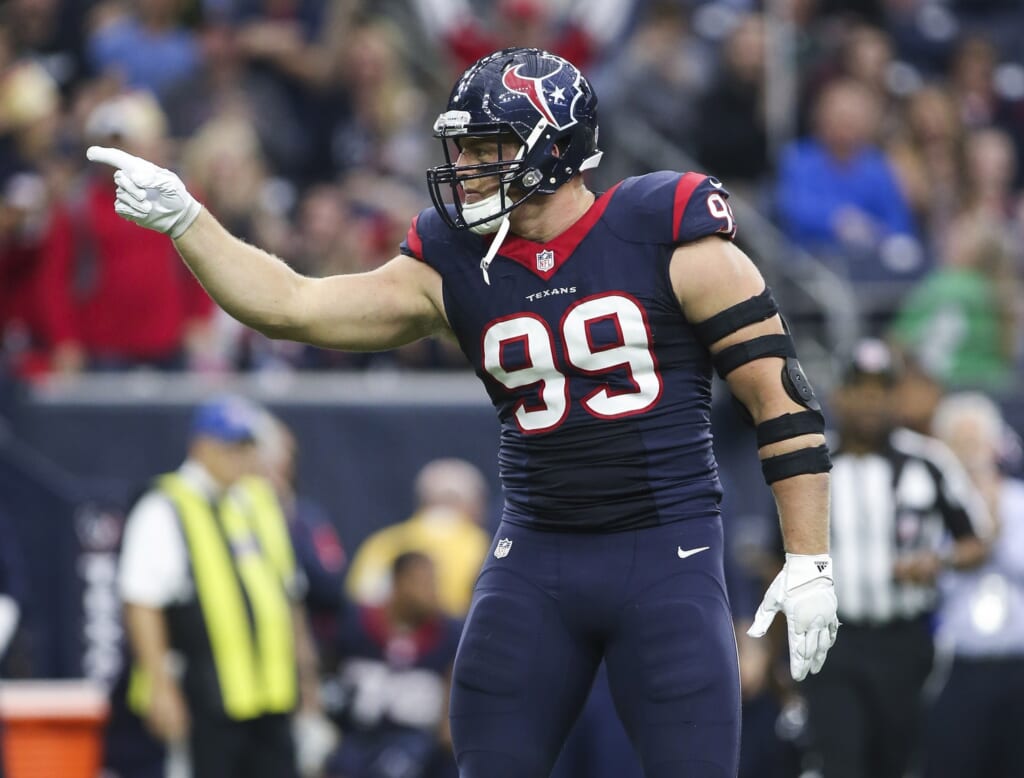
The Houston Texans have the roster of a Super Bowl contender. There are as many big names on this team as any other. The defense ranked seventh in DVOA last year while missing the best defensive player in football, and there’s a bucketful of talent on the offense. In one sentence, that’s a good summation of what a title contender might look like.
But at the same time, Houston ranked 29th in overall DVOA last season. A large part of that was because of the quarterback situation — easily the biggest thing preventing them from being an actual Super Bowl contender — but there were other factors at play. Their head coach, Bill O’Brien, continually made terrible game management decisions. Their special teams unit ranked 31st in DVOA — the fifth year in a row it was 28th or worse. They scooted by in close games but rarely played like an actual contender.
The roster — with one very notable exception — is there. But the execution is not.
Houston did its best to address that exception this offseason, taking DeShaun Watson with the 12th overall pick in the draft. Watson was the best quarterback in this draft class, but at the same time, this was a weak draft class for quarterbacks. He won’t be the starter at the beginning of the season; Tom Savage was given officially given the job last week.
Savage, who has started just two games in his three year career, is something of a lame duck. Nobody expects him to last long in the job — he’s more a placeholder until the coaching staff feels Watson is ready. However, there’s question as to whether he can be a replacement-level quarterback. In the two games he started last year, Savage was okay, but that’s a a 73-throw sample size. We’ve seen a lot of quarterbacks look competent over a couple games, then fall apart once the league has seen what they can do.
If things go well, Watson will be under center before that ever happens. The biggest part of his game that needs fixing is eye manipulation. Watson had a tendency to stare down his first read at Clemson, where the offense rarely called for him to make a full field read. There were flashes where Watson displayed ability in this area, but the mistakes were far more consistent. For the most part, he was doing things that would make NFL defensive backs lick their chops — it was usually very obvious who he was throwing to when the ball was snapped.

Learning how to operate an NFL huddle and play from under center is something Watson probably spent a lot of time on in training camp as well. He played most snaps from the shotgun in college and failed to recognize oncoming blitzes a little too often. Despite these issues, Watson will still be the best quarterback to come out of this draft. He has good arm strength and strong accuracy, especially at the short and intermediate levels. Watson can also break the pocket and run, which adds a wholly different element to Houston’s offense. Moreover, he showed progress throughout last season in areas like eye manipulation, clearly the result of working on those things, and displayed good ability to throw deep. He’s played at the highest level of college football and came up big, leading Clemson to a national title last season.
It may take some time, but Watson is going to be a good NFL quarterback.
Houston’s biggest problem at the skill positions last season was the ratio of talent to production. There is a ton of talent here and, with the possible exception of DeAndre Hopkins, you wouldn’t have known it from looking at the stats last year. Even Hopkins’ numbers weren’t quite up to par — in fairness to him, that had a lot to do with then-quarterback Brock Osweiler. Despite going for 954 yards, Hopkins ranked 66th among receivers in DYAR and 70th in DVOA last season. This is one of the best players in the league when it comes to things like 50/50 balls, and he had just a 51 percent catch rate last year. If the Texans can’t find a better way to utilize him than they did last year, the entire coaching staff should resign.

Behind Hopkins, Will Fuller is one of the biggest threats in the league when it comes to yardage after the catch, in theory. In practice, Fuller was 78th among receivers in DYAR last season and had just 635 yards. He won’t be on the field at the start of the year due to a clavicle injury, but should be back relatively early. Braxton Miller is in the same boat when it comes to talent versus production. Everyone saw what he could do at Ohio State back in college, but the Texans didn’t really seem to understand how to make Miller useful last year. He had just 15 receptions on 28 targets. Even Jaelen Strong, an über-talented guy at Arizona State, has been a non-factor in two years with the Texans. Strong is suspended for the opening game of the year, but he should be a part of this offense, especially if they plan on throwing deep to anybody other than Hopkins. It’s a travesty that tight end C.J. Fiedorowicz had more targets last season than Miller and Strong combined. Fiedorowicz, by the way, ranked 40th among tight ends in DYAR despite 54 receptions.
At running back, the Texans gave Lamar Miller all the touches he ever desired last year, and he did jack squat. He averaged a career-low 4.0 yards per carry, barely hitting the 1,000-yard mark. Miller also had just a 45 percent success rate and finished 34th among running backs in DYAR.
Miller won’t get as much work this year after Houston drafted D’Onta Foreman in the third round. This may be good for his production given how well Miller did with less work in Miami. If not, Foreman has enough talent to steal the job. At Texas, he displayed great vision as a power back. He’s hard to bring down and can run in the open field. Foreman isn’t great as an East-West runner and needs improvement when it comes to pass protection. Expect Miller to own third downs as well. However, Foreman is going to be a force when the Texans run power and could get a lot of work in short yardage situations as well.
Houston’s offensive line is a mixed bag trending downwards. Left tackle Duane Brown had an 84.6 PFF grade last season and didn’t give up a sack, per Football Outsiders’ Almanac. He’s also holding out (still) over a contract dispute. Center Greg Mancz ended up being a good replacement for Ben Jones, allowing 0.5 sacks and blowing only 11 blocks, per FOA. After right tackle Derek Newton went down for the season, however, Houston has struggled to find a replacement. Right now, it looks like Breno Giacomini will take the job. Giacomini is 32 years old, played just five games last year, and had a 47.6 PFF grade. At guard Jeff Allen and Xavier Su’a Filo had PFF grades of 41.0 and 44.9 last season. Su’a-Filo gave up 5.0 sacks, blowing 11 pass blocks last season, per FOA, while Allen blew 18 blocks on the year. It’s hard to have a ton of faith in this group despite it putting up decent numbers last year.
If the Texans end up in the playoffs again — it could be tough given how much better the Titans are after the offseason — it will be because of their defense.
J.J. Watt returns from an injury that saw him play just three games last season. Assuming Watt is at full strength, he’s the best defensive player in football without much question. He led the entire league in approximate value in both 2014 and 2015. Two years ago, despite battling injury, Watt had a league-leading 17.5 sacks, 33 hits and 51 hurries, per Football Outsiders’ premium database. That year, he also ranked second at his position with a 91 percent run stop rate as well, per FO. Alongside Watt on the defensive line, nose tackle D.J. Reader is only 23 years old and had a 90 percent run stop rate last season, per FOA. Defensive end Christian Covington had a 71.8 PFF grade last season and is only 24 years old. Joel Heath was a nonfactor last year in just 277 snaps, but should be in the rotation again this year.

In addition to Watt, Houston has two of the best pass rushers in football. We finally saw what a healthy, unleashed Jadeveon Clowney could do last season and he did not disappoint. Clowney had 6.0 sacks, 12 hits and 33 hurries in addition to an 80 percent run stop rate last year, per FOA. Outside linebacker Whitney Mercilus put up an 87.6 PFF grade along with 7.5 sacks, 13 hits and 31 hurries, per FOA.
On the inside, Brian Cushing was top 10 among linebackers with a 73 percent run stop rate in 2016. However, Cushing also had a paltry 37 percent success rate in coverage last season, per FOA. Next to him, Bernardrick McKinney picked up some of the slack, with an 80.1 coverage grade from PFF and 48 percent success rate, per FOA. Sio Moore may get a decent number of snaps on passing downs as well. He gave up just 6.4 adjusted yards per target last season, according to FOA, along with an 81.1 coverage grade.
The secondary lost its best player, A.J. Bouye, during the offseason. However, there was enough depth that it should be able to survive, health pending. Kareem Jackson had a 51 percent success rate last year along with a 76.9 PFF grade. Kevin Johnson played just six games but looked very good, putting up a 56 percent success rate and allowing just 6.0 adjusted yards per target, according to FOA. 33-year-old Johnathan Joseph started to show some slippage last season, but still had a 75.6 PFF grade. Robert Nelson is a decent enough backup, though things could get dicey if there are injuries here.
At safety, Eddie Pleasant and Corey Moore are both fine. They had PFF grades of 75.3 and 74.4 last year — nothing to brag about. But the position is far from an issue. Andre Hal and Marcus Gilchrist should be good backups as well. This defense, however, will make its bones on rushing the passer, not necessarily with coverage.
Losing Bouye — one of the best corners in football last season — is going to hurt. But Houston can still be a top-five defense without him.
We usually don’t talk about special teams in these previews, but its worth noting that special teams coordinator Larry Izzo is in his second year at the position and Houston desperately needs some improvement. This has been an issue with the Texans since forever, and it has to change at some point if they really want to contend.
If the special teams get fixed, Watson plays decently right away and the rest of the offense lives up to his talent, the ceiling for this team is very high. But that’s a lot to ask. The more likely scenario: another year hovering around .500 without a playoff appearance to compensate.
If you would like to learn more about the advanced stats we used, check out FootballOutsiders.com, which is largely free, or ProFootballFocus.com which is not.